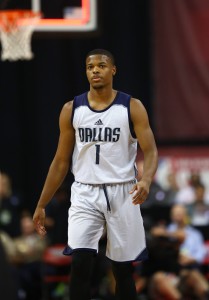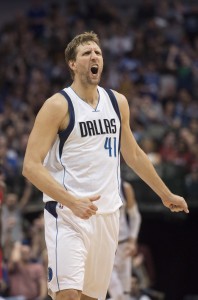The Mavericks finished with a losing record last season for the first time since the 1999/2000 campaign, and the team’s 33-49 mark, good for 11th place in the Western Conference, appeared to serve as a wake-up call.
Having been a perennial player for big-money free agents in recent years, the Mavericks sat out the summer fun in 2017, rightly recognizing that they weren’t just a player or two from title contention. When the Mavs won the championship in 2011, they were one of several teams that had a viable shot at a title, but the dominance of the present-day Warriors likely helped Mark Cuban and company realize that it would require more than just a little good fortune in the postseason to return to the NBA Finals.
Rebuilding certainly wasn’t the Mavs’ preference — the club had prioritized win-now moves over the last several years in the hopes of getting Dirk Nowitzki a shot at one last title. But even with the clock running out on Nowitzki’s playing career, the time was right for a rebuild in Dallas, as the team entered the offseason with a top-10 draft pick in hand for the first time in nearly two decades. With many of their conference rivals loading up to make a run at Golden State, the Mavs made a $5MM guarantee for Nowitzki their biggest free agent expenditure of the summer.
Key offseason losses:
The Mavericks’ transition from a veteran club with playoff aspirations to a younger, retooling squad began during the 2016/17 season, when the team jettisoned players like Andrew Bogut and Deron Williams. By the time the offseason arrived, there weren’t many expendable vets left to part ways with, so the Mavs’ list of departures is short and mostly inconsequential.
Dallas decided that DeAndre Liggins and Jarrod Uthoff wouldn’t be a part of the club’s future, sending them to the Rockets in a pair of late-June trades for cash considerations. Nicolas Brussino was also shown the door, with the Mavs waiving him rather than guaranteeing his 2017/18 salary. The club moved on from A.J. Hammons as well, including him in a trade with the Heat, a deal that allowed the Mavs to create a little more cap room in 2018 and 2019.
Key offseason additions:
Although the Mavericks didn’t go out and sign any major free agents, the team made sure to lock up its own key veterans, bringing back Nowitzki and Nerlens Noel on short-term deals. The Mavs entered the summer with a $25MM team option on Nowitzki and an $11MM cap hold on Noel, with the expectation that re-signing those two players would eat up most of the club’s cap room.
However, Nowitzki signed a modest two-year, $10MM contract that features a second-year team option, while Noel – having reportedly turned down a $70MM offer at the start of free agency – ultimately signed his one-year qualifying offer, worth less than $4.2MM.
The Mavs got a great 2017/18 rate on the duo, but the fact that Noel can become an unrestricted free agent next summer is somewhat troublesome. If Noel battles injuries and underperforms again in 2017/18, the risk will pay off for the Mavs, but if he has a breakout year in Dallas, the young center will get a whole lot more expensive in 2018 and the club won’t have the right of first refusal available to prevent him from signing elsewhere.
One player who will be a Mav for years to come – and who represents the team’s most significant offseason addition – is Dennis Smith Jr., the ninth overall pick in this year’s draft. Smith looked terrific in Summer League action and is gaining some early buzz as a Rookie of the Year favorite.
The Mavs have gone through a revolving door of players at the point guard spot in recent years, so the team is understandable thrilled to have a young, inexpensive potential star at the position for at least the next four years, and potentially much longer.
Outside of Smith, the Mavs’ additions were minor, with journeyman center Jeff Withey and German forward Maxi Kleber among those expected to stick with the regular season roster.
Outlook for 2017/18:
While the Mavs still have several veteran rotation players on their roster, the focus for 2017/18 should be on developing guys like Smith, Harrison Barnes, Dwight Powell, and perhaps Noel, if he remains in Dallas’ long-term plans.
With nearly every other Western Conference team eyeing the playoffs, the Mavs should be fine with landing on the lottery, and it wouldn’t be a huge surprise to see the club move a couple of its veterans – perhaps Wesley Matthews or J.J. Barea – before the trade deadline to help improve its lottery positioning.
Dallas is also in a great position to use its cap flexibility to its advantage. With the salary cap not increasing as rapidly as many teams expected, more clubs figure to be looking to dump bad contracts and excess salary in an effort to regain 2018 space (or to avoid the tax). Those teams will likely be willing to attach young players or draft picks to their negative assets to make a deal, and the Mavs should be ready to accommodate them, as they were on a smaller scale with the Heat and Josh McRoberts.
A non-playoff rebuilding year perhaps isn’t what Nowitzki had in mind for this stage in his career, but he’ll be an invaluable mentor to the Mavs’ young players. If the team can identify a handful of core pieces and puts itself in a position to add more of those pieces, the 2017/18 season should be considered a success.
Salary information from Basketball Insiders used in the creation of this post. Photos courtesy of USA Today Sports Images.

